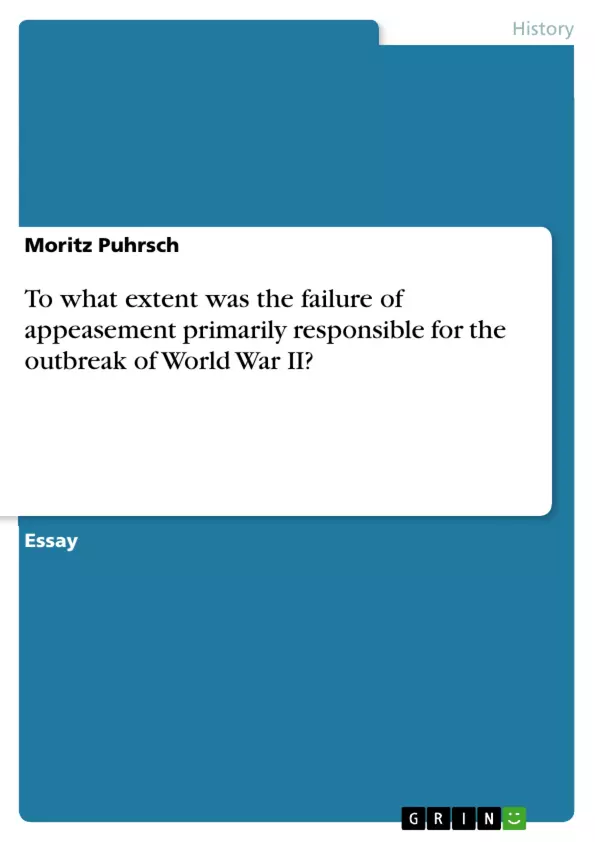This essay looks at the extent of the impact that the failure of the diplomacy of appeasement had in terms of its responsibility for the outbreak of the second world war.
Table of Contents
- Section A:
- Section B:
- Section C:
Objectives and Key Themes
This investigation aims to determine the extent to which the failure of appeasement was primarily responsible for the outbreak of World War II. It explores the historical context of appeasement, analyzing the arguments for and against its effectiveness. The investigation weighs the impact of appeasement against other contributing factors to the war's outbreak.
- The policy of appeasement in the 1930s
- The "Guilty Men" thesis versus the "Buying Time" thesis
- Competing interpretations of historical events leading to WWII
- The role of domestic politics in shaping foreign policy
- The influence of factors beyond appeasement in causing WWII
Chapter Summaries
Section A: This section analyzes two primary sources: Paul Johnson's "Modern Times" and Joachim Fest's "Hitler." Johnson's work, viewed through the lens of his British perspective and conservative leanings, supports the "Guilty Men" thesis, arguing that the Allies should have acted against Hitler earlier. While detailed, its broader focus beyond appeasement presents a limitation. Conversely, Fest's biography of Hitler, informed by his family's opposition to the Nazi regime, provides a critical perspective and supports the "Buying Time" thesis. Despite its valuable insights, its primary focus on Hitler, rather than appeasement specifically, and limitations in the documents available to Fest at the time of writing, also limits its scope in this context. Both sources, however, offer crucial perspectives on the complexities of appeasement and its aftermath.
Section B: This section delves into the highly contested debate surrounding appeasement's impact on the outbreak of World War II. It presents the opposing "Guilty Men" and "Buying Time" theses, highlighting the contrasting viewpoints on whether proactive opposition to Hitler or a delayed confrontation was the more effective approach. The section explores the reasons behind Britain's policy of appeasement, including fears of communism, perceived injustices of the Treaty of Versailles, and the prevailing pacifist sentiment within British society following the devastating losses of World War I. The section's focus lies on the multifaceted nature of appeasement, considering both political calculations and public sentiment.
Keywords
Appeasement, World War II, "Guilty Men" thesis, "Buying Time" thesis, Chamberlain, Hitler, Munich Conference, Treaty of Versailles, British foreign policy, domestic politics, pacifism, global depression.
Frequently Asked Questions: A Comprehensive Language Preview
What is the purpose of this document?
This document provides a comprehensive preview of a language analysis, including the table of contents, objectives and key themes, chapter summaries, and keywords. It offers a structured overview suitable for academic use and thematic analysis.
What are the main themes explored in this analysis?
The central theme revolves around the debate surrounding the effectiveness of appeasement in the lead-up to World War II. This includes exploring the "Guilty Men" thesis (arguing appeasement was a failure) and the "Buying Time" thesis (arguing appeasement was a necessary strategy). The analysis also considers the impact of domestic politics, public sentiment, and other contributing factors alongside appeasement in causing the war.
What primary sources are analyzed?
The analysis utilizes Paul Johnson's "Modern Times" and Joachim Fest's biography of Hitler. These sources offer contrasting perspectives on appeasement, with Johnson leaning towards the "Guilty Men" thesis and Fest supporting the "Buying Time" thesis. The document acknowledges limitations in both sources' scope and perspectives, particularly regarding their focus beyond the specific issue of appeasement.
What are the key arguments presented in Section A?
Section A critically examines Paul Johnson's and Joachim Fest's perspectives on the events leading up to World War II. It highlights the authors' biases and the limitations of their respective works concerning the appeasement policy, emphasizing the importance of considering multiple viewpoints to achieve a comprehensive understanding.
What is the focus of Section B?
Section B delves into the debate surrounding appeasement's role in the outbreak of World War II. It directly addresses the "Guilty Men" and "Buying Time" theses, contrasting the arguments for and against proactive opposition to Hitler's regime. It further explores the complex interplay of political calculations and public opinion in shaping Britain's appeasement policy.
What are the key takeaways from this preview?
The preview emphasizes the complexity of historical interpretations, particularly regarding the causes of World War II. It highlights the need to consider multiple perspectives and weigh various factors – beyond just appeasement – to reach a balanced understanding of the events leading to the war. The document promotes critical engagement with historical sources and encourages consideration of the biases inherent within those sources.
What are the key words associated with this analysis?
Key words include: Appeasement, World War II, "Guilty Men" thesis, "Buying Time" thesis, Chamberlain, Hitler, Munich Conference, Treaty of Versailles, British foreign policy, domestic politics, pacifism, and global depression.
- Citation du texte
- Moritz Puhrsch (Auteur), 2019, To what extent was the failure of appeasement primarily responsible for the outbreak of World War II?, Munich, GRIN Verlag, https://www.grin.com/document/505453



